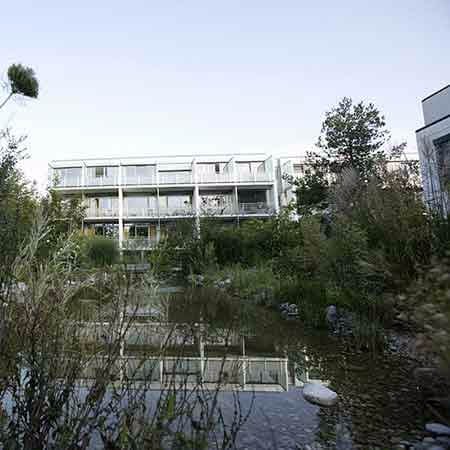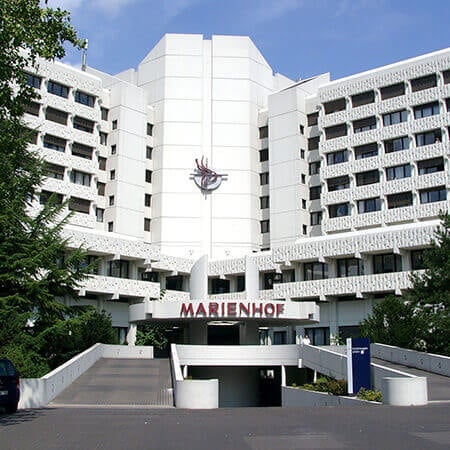Kidney cancer (Renal cancer)
Kidney cancer is included in the top-ten most common cancer types and accounts for 2-4% of all the malignant tumors in different countries. The highest incidence among European countries is observed in Russia and Great Britain. This number tends to grow, but life expectancy of patients is also increasing due to the improved treatment techniques.
The Booking Health portal presents 72 German clinics specializing in kidney cancer (renal cancer) treatment
Show all clinics
Kidney cancer – Diagnostics
The following diagnostic measures are performed to confirm the diagnosis:
Cytological examination of urine sediment, as cancer cells can be found in it.
Methods of visualization like ultrasound examination, MRI, computed tomography are used. They can detect a tumor-like formation in the kidney. Also, visualization methods are used to:
- Estimate the prevalence of the pathological process
- Evaluate treatment effectiveness
- Detect signs of tumor recurrence after treatment
During fine-needle biopsy doctor takes tissue sample for cytological and histological analysis. It is not necessary to do biopsy to confirm kidney cancer. Nevertheless, it is obligatory in the certain cases, when it’s impossible to confirm the diagnosis other way.
Positron-emission tomography (PET) is a high-tech research method available in German hospitals. It is very rarely used in the developing countries, since most hospitals do not have the appropriate equipment. PET can detect small foci of the tumor, including metastases in the lymph nodes. During the examination fluorodeoxyglucose, which is accumulated much faster in cancer cells than in the healthy tissues, is introduced into the patient’s body.
Excretory urography is an additional diagnostic technique used if there is a need to access kidneys function. A contrasting agent is administered intravenously and then excreted by the kidneys with different speed, depending on the kidneys’ function. The location and amount of contrast medium is determined by X-ray images, which are performed at regular intervals.
Angiography is an X-ray examination with the introduction of contrast dye into the renal artery that is used in the planning of kidney cancer surgical treatment.
Best clinics for the kidney cancer diagnostics in Germany:
Kidney cancer – Treatment
Surgery is the basis of kidney cancer treatment. Volume and type of surgery is determined by the certain clinical case. A doctor performs partial or complete nephrectomy. This means, that a kidney or its damaged fragment are removed.
Also, some other organs can be removed by surgeon’s decision:
- Lymph nodes
- Ureter or its fragment
- Adrenal gland
- Fat tissues surrounding the kidney
Doctors more often completely remove a kidney, as this surgery is simpler. Nevertheless, specialists in developed states give preference to the partial nephrectomy. The surgery is more complex, but it gives a chance to preserve an organ.
There are contraindications to partial nephrectomy:
- Tumor size over 7 cm
- Central location of a tumor
- Presence of several tumors
- Presence of metastases
Kidney cancer doesn’t respond to chemotherapy. It responds to the radiation therapy, but still poorly. Thus, these techniques are rarely used. Radiation therapy may be used as a palliative treatment to ease cancer symptoms.
The treatment of kidney cancer stage 4 has certain peculiarities. In addition to surgery, chemo- and radiotherapy, doctors use targeted therapy and immunotherapy. Targeted therapy is a type of cancer treatment that targets specific proteins or genes that are involved in the growth and spread of cancer cells. Immunotherapy is a type of cancer treatment that uses the body's immune system to fight cancer. You can find more detailed information about immunotherapy for kidney cancer here.
The cost of da Vinci partial or complete nephrectomy for kidney cancer (renal cell cancer) is between 16,100 EUR and 23,200 EUR.
Kidney cancer – Innovative treatments
New treatment techniques are developed constantly while the existing ones are undergoing improvement to reach better therapeutic results.
Target therapy has been used in the recent years at the advanced stages of kidney cancer to slow down the growth of the malformation and increase patient’s life expectancy:
- Medicines that block blood vessels, which feed the tumor - Sorafenib, Sunitinib
- MPM inhibitors (protein that controls the division of tumor cells) – Temsirolimus
Robotic laparoscopic nephrectomy is the operation performed by a robot controlled by the surgeon remotely. A tube with a camera and surgical instruments are inserted into the patient's body through the small incisions. Robotic laparoscopic nephrectomy makes it possible to achieve:
- Reduction of complications risk
- Reduction of blood loss during surgery
- Reduction of the rehabilitation period
- Reduction of postoperative pain
- Reduction of inpatient stay and inability to work
Surgeons in German hospitals have great experience of robotic laparoscopic surgeries for kidney cancer treatment. But such surgical interventions are possible only if a tumor diameter does not exceed 10 cm. When deciding on the method of surgical treatment, it is also considered whether the tumor germinates into the renal vein or lymph nodes.
PD-1 and PD-L1 inhibitors are a whole group of new medicines that block proteins hiding a tumor from the immune system. Recent studies have proved that Nivolumab medicine increases patients’ life expectancy at the advanced stages of kidney cancer.
Dendritic cells are the cells of the immune system taken from the patient's blood. They are processed with cytokines in the presence of inactivated cancer cells. As a result, immune cells “remember” tumor antigens. Afterwards, they are injected back into the body. Dendritic cells “show” what they managed to “remember” to other cells of immunity – those that are responsible for the destruction of foreign agents. Now, the immune system “knows” what a tumor looks like, and begins to attack it. The method is still at the stage of clinical research, but already demonstrates encouraging results.
Radiofrequency ablation and cryotherapy (cryoablation) are minimally invasive methods of treatment at the initial stage of cancer. In the first case, the tumor is heated to a high temperature, in the second - it is frozen. As a result, tissue death occurs. The effectiveness and expediency of using these techniques for kidney cancer treatment has not been proven so far and the trials still continue.
Treatment of stage 4 kidney cancer
Systemic methods are usually used for the treatment of stage 4 kidney cancer, but some patients still remain candidates for radical surgery. During a combined operation, doctors can remove the kidney and single metastases in other organs.
Treatment of stage 4 kidney cancer is most commonly conservative. Chemotherapy for any stage of kidney cancer is rarely used because it has low effectiveness. But there are other drug treatments for stage 4 kidney cancer that work well, such as targeted therapy and immunotherapy.
Targeted therapy most often involves the use of angiogenesis inhibitors with different mechanisms of action. mTOR inhibitors can also be used for some patients with stage 4 cancer, usually as second-line therapy.
Treatment regimens for stage 4 cancer often include immunotherapy with PD-1, PD-L1, and CTLA-4 inhibitors. They prevent the tumor from evading attacks from the immune system. Cytokines, such as interleukin-2 and interferon-alpha, can also be used. The latter is less effective but gives good results in combination with the angiogenesis inhibitor bevacizumab.
Best clinics for the kidney cancer treatment in Germany:

University Hospital of Ludwig Maximilian University of Munich

Kidney cancer – Rehabilitation
After treatment of complex oncological diseases most patients require rehabilitation. It includes the following aspects:
- Prevention of complications that may occur as a result of treatment. It can be pneumonia, lymphostasis, thromboembolic or infectious complications.
- Restoration of general health. The elimination of the consequences after surgeries and chemotherapy is carried out. The functions of internal organs are restored with the help of various medical and rehabilitation measures.
- Restoration of occupation. A person must not just stay alive. He must have physical and intellectual capabilities, which are sufficient for employment.
- Psychological support. First of all, it is required for patients, whose occupational performance was harmed because of the disease. Patients with deterioration of appearance also will benefit from psychological help.
- Restoration of appearance. If necessary, you can use surgical and other methods in Germany to restore appearance defects caused by cancer. For example, to carry out the reconstruction of the breast.
- Social and domestic rehabilitation. A person with reduced workability is trained to act in the society and perform everyday tasks in new conditions.
In German clinics, rehabilitation is carried out in a comprehensive manner. The patients are provided with qualitative care here. Doctors' monitoring and conservative treatment allow to avoid complications, which usually happen after treatment of oncological diseases. Psychotherapy, physiotherapy and physical therapy are actively used in Germany.
Specialists in different medical spheres take part in the rehabilitation process. These are massage therapists, speech therapists, specialists in physiotherapy exercises, physiotherapists. Social and occupational therapy is carried out, as well. If necessary, people are taught how to eat properly, take care of a colostomy or urostomy, etc.
In Germany, rehabilitation is carried out with the maximum level of comfort for the patient. A person feels the results quite quickly and it improves his motivation and promotes further recovery.
Best clinics for oncological rehabilitation in Germany:
Author:
The article was edited by medical expert, board certified Dr. Nadezhda Ivanisova. For the treatment of the conditions referred to in the article you must consult a doctor; the information in the article is not intended for self-medication!
Source:
Cancer Treatment Centers of America
The cost of services includes
Here you can find the cost of treatment for this disease at the German University Hospitals. Leave a request and we will provide a free consultation with a doctor and will start organizing the whole treatment process.
The program includes the following:
- Issuing of an invitation for getting a visa for treatment as quick as possible
- Fixing an appointment at a time convenient for you
- Preliminary organization of a comprehensive examination and discussion of the forthcoming treatment plan
- Arranging transfer from the airport to the hospital and back to the airport
- Provision of interpreting services and services of a personal medical coordinator
- If necessary, assistance in the organization of further surgical treatment
- Provision of a medical insurance against treatment complications covering up to 200,000 euro
- Preparation and translation of medical records and recommendations from the hospital
- Assistance in the subsequent communication with your attending physician, including consultations on repeated X-ray images through the unique medical document management system E-doc




